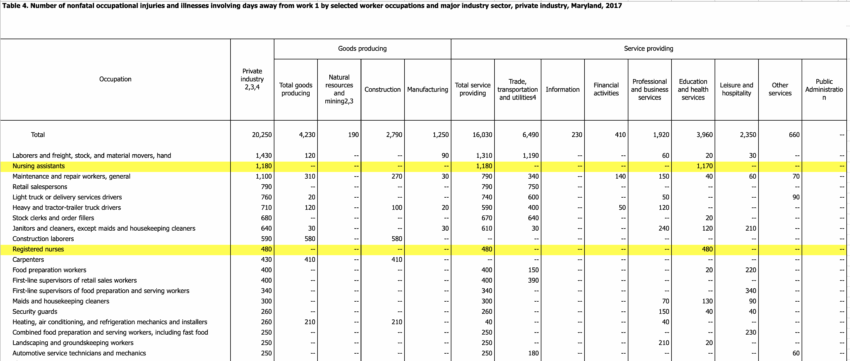Professional Focus: Common Nurse Injuries

Healthcare professionals, now more than ever, are essential to keeping communities safe and healthy. Because of the potential hazards often found in medical facilities, these individuals face the highest number of work-related injuries and illnesses in the US. According to 2017 OSHA data, "the healthcare sector reported 582,800 cases of work-related injuries and illnesses, 153,900 more cases than the next industry sector, manufacturing."
More specifically, nursing staff, which encompass the following titles, are particularly vulnerable to workplace mishaps that lead to seeking workers' compensation:
- Nursing Assistant (CNA)
- Licensed Practical Nurse (LPN)
- Registered Nurse (RN)
- Advanced Practice Registered Nurses (APRN)
In the following post, we provide an overview of common injuries suffered by nurses while working and how a workers' comp attorney can help if they wish to pursue a claim.
Common Occupational Injuries Faced by Nurses
2017 Maryland Department of Labor's Division of Labor & Industry's Research & Statistics Unit data showed that Registered Nurses and Nursing Assistants reported a total of 1,660 work-related injuries and illnesses that required time away from work. While state data does provide some further information about the types of injuries or illnesses faced by these individuals, we provide greater detail around common nursing injuries below.

Musculoskeletal Injuries
- Sprains and strains stemming from overexertion of muscles while caring for patients and moving equipment
- Repetitive movements and long periods of being on their feet can also cause issues for nurses
Needle and Other Sharp Object Pricks
- Nurses may have their skin accidentally pricked while administering medications or drawing blood
Slips and Falls
- Because of the presence of fluids on healthcare facilities' floors, nurses could slip and injure themselves
Violence
- Emotionally-charged patients, their families, or their friends all present a risk of violence, regardless of what type of facility a nurse works in
- Nurses working in a correctional facility may also be subjected to additional workplace violence from inmates
Exposure to Diseases
- Interacting with patients and their bodily fluids on a regular basis exposes nurses to airborne or other forms of contagious diseases
What Options Do Nurses Have Following a Workplace Injury?
Option 1: File a Workers' Comp Claim
If a physical injury happens as a result of carrying out work duties, a nurse may file a workers' comp claim with the state's workers' compensation commission. Depending on the injuries, an individual may be eligible for disability benefits while they recover or if they are found to be temporarily or permanently disabled. It is best to first consult with a workers' compensation attorney immediately following the injury.
Option 2: File a Personal Injury Lawsuit
Maryland laws related to workplace accidents prevent an individual from suing their employer for damages. However, if a third-party caused the injuries, a nurse may be able to pursue a personal injury case. They will need to prove that the defendant was negligent or intentionally did something wrong in a way that caused harm in order to collect compensation.
How We Can Help
Working with an experienced workers compensation law office like Shultz Legal can help ensure your or a loved one's case gets the proper attention it deserves. Start by either calling our office or requesting a consultation using our online form.
